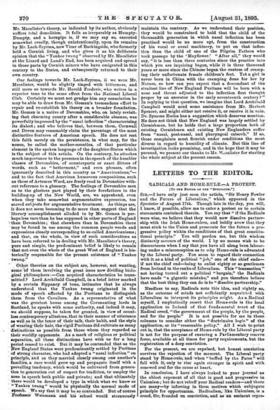LETTERS TO THE EDITOR:
RADICALS AND HOME-RULE.--A PROTEST.
[To THE EDITOR OF THE " SPECTIITOR."] Sra,—I have only just seen the article, "Sir Henry Fowler and the Future of Liberalism," which appeared in the Spectator of August 17th. Though late in the day, you will, I know, if possible, allow me to enter a protest as to certain statements contained therein. You say that " if the Radicals were wise, we believe that they would now dissolve partner- ship with the Irish Home-rulers, and boldly avow that they must stick to the Union and prosecute for the future a pro- gressive policy within the conditions of that great constitu- tional principle." You will pardon me, but this wisdom distinctly savours of the world. I by no means wish to be discourteous when I say that you have all along been labour- ing under a misconception as to why Home-rule is advocated by the Liberal party. You seem to regard their connection with it as a kind of political " job," one of the chief ends— if not the chief end—being to enlist eighty or so gentlemen from Ireland in the ranks of Liberalism. This "transaction" not having turned out a political "bargain," the Radicals have made "a gigantic mistake," and you therefore believe that the best thing they can do is to " dissolve partnership."
Needless to say, Radicals note this idea, and rightly so, as the outcome of minds not sufficiently acquainted with Liberalism to interpret its principles aright. As a Radical myself, I emphatically assert that Home-rule is the local application to Ireland of that fundamental tenet of the Radical creed, "the government of the people, by the people, and for the people." It is not possible for me in these columns to consider either the "doctrinaire logic" of the application, or its "reasonable policy." All I wish to point out is, that the acceptance of Home-rule by the Liberal party is not for the purpose of ensuring a Parliamentary reserve force, available at all times for party requirements, but the registration of a deep conviction.
For the present, we are repulsed, but honest conviction survives the rejection of the moment. The Liberal party stand by Home-rule, and when "baffled by the Fates" will fall with it, only to rise again stronger in spirit and with renewed zeal for the cause at heart.
In conclusion, I have always looked to your journal as the ablest exponent of all that is good and progressive in Unionism; but do not rebuff your Radical readers—and there are many—by inferring in them motives which subjugate principle for opportunism. Radicalism, like Unionism, is a creed, Sir, founded on conviction, and as an eminent repre-
sentative of its opponents, I would ask you to recognise it as such when mentioned in these columns.—I ans, Sir, &c.,
G. W. HOLFORD KNIGHT.
172 Fernhead Road, Maida Hill, W.



































 Previous page
Previous page